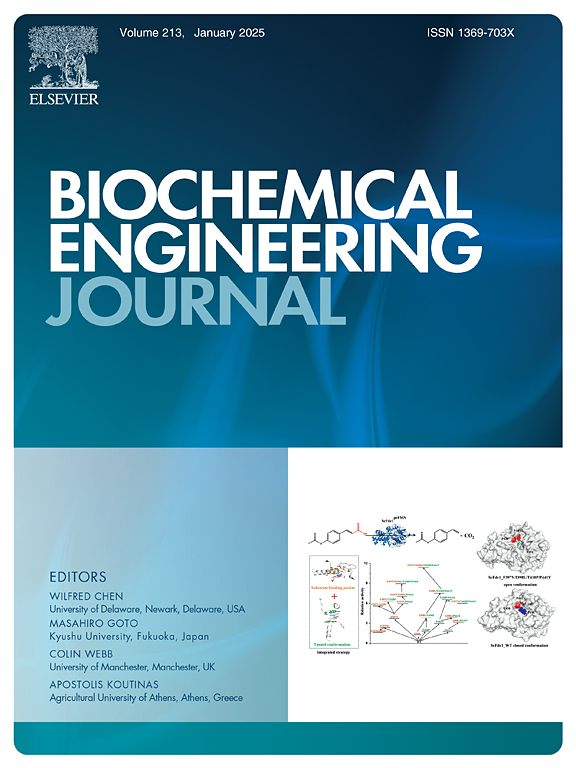利用合成生物学促进可持续工业创新:进展、挑战和未来方向
IF 3.7
3区 生物学
Q2 BIOTECHNOLOGY & APPLIED MICROBIOLOGY
引用次数: 0
摘要
合成生物学(Synbiology)是一门新兴的科学,它利用生物系统的基因工程来完成工业操作并生产有价值和期望的产品。受合成生物学启发的生物系统制造和重编程为揭示化学和生物工程中的关键问题以及利用增值化学品的生产开辟了道路,包括生物疗法、食品、生物化妆品、生物聚合物和生物燃料。然而,工程生物系统在精度、可扩展性和市场可行性方面仍然远远落后于设计物理系统。从分子化合物选择到大规模商业生产,解决这些限制对于释放合成生物学的全部工业潜力至关重要。本文综述了合成生物学在工业生产中的创新贡献,强调了其在促进高价值化学品的可持续生产、提高工业效率、优化生物燃料生产以及实现碳捕获和利用方面的作用。研究结果强调了基于合成生物学的技术在推动生物经济和促进可持续未来方面的关键作用,同时确定了必须解决的技术瓶颈,以提升生物工程实践以与其他工程学科相匹配。本文章由计算机程序翻译,如有差异,请以英文原文为准。
Harnessing synthetic biology for sustainable industrial innovation: Advances, challenges, and future direction
Synthetic biology (Synbiology) is an emerging science that leverages the genetic engineering of biological systems to accomplish industrial operations and produce valuable and desired products. Synbiology-inspired fabrication and reprogramming of biological systems has opened avenues for unearthing critical questions in chemical and biological engineering and harnessing the production of value-added chemicals, including biotherapeutics, food items, biocosmetics, biopolymers, and biofuels. However, engineering biological systems still lags far behind designing physical systems in precision, scalability, and market viability. Tackling these limitations is essential to unlocking the full industrial potential of Synbiology, from molecular compound selection to large-scale commercial production. This review x-rays the innovative contributions of Synbiology to industrial operations, emphasizing its role in advancing sustainable production of high-value chemicals, enhancing industrial efficiency, optimizing biofuel production, and enabling carbon capture and utilization. The findings highlight the pivotal role of Synbiology-based technology in driving a bio-based economy and fostering a sustainable future while identifying technical bottlenecks that must be addressed to elevate bioengineering practices to match other engineering disciplines.
求助全文
通过发布文献求助,成功后即可免费获取论文全文。
去求助
来源期刊

Biochemical Engineering Journal
工程技术-工程:化工
CiteScore
7.10
自引率
5.10%
发文量
380
审稿时长
34 days
期刊介绍:
The Biochemical Engineering Journal aims to promote progress in the crucial chemical engineering aspects of the development of biological processes associated with everything from raw materials preparation to product recovery relevant to industries as diverse as medical/healthcare, industrial biotechnology, and environmental biotechnology.
The Journal welcomes full length original research papers, short communications, and review papers* in the following research fields:
Biocatalysis (enzyme or microbial) and biotransformations, including immobilized biocatalyst preparation and kinetics
Biosensors and Biodevices including biofabrication and novel fuel cell development
Bioseparations including scale-up and protein refolding/renaturation
Environmental Bioengineering including bioconversion, bioremediation, and microbial fuel cells
Bioreactor Systems including characterization, optimization and scale-up
Bioresources and Biorefinery Engineering including biomass conversion, biofuels, bioenergy, and optimization
Industrial Biotechnology including specialty chemicals, platform chemicals and neutraceuticals
Biomaterials and Tissue Engineering including bioartificial organs, cell encapsulation, and controlled release
Cell Culture Engineering (plant, animal or insect cells) including viral vectors, monoclonal antibodies, recombinant proteins, vaccines, and secondary metabolites
Cell Therapies and Stem Cells including pluripotent, mesenchymal and hematopoietic stem cells; immunotherapies; tissue-specific differentiation; and cryopreservation
Metabolic Engineering, Systems and Synthetic Biology including OMICS, bioinformatics, in silico biology, and metabolic flux analysis
Protein Engineering including enzyme engineering and directed evolution.
 求助内容:
求助内容: 应助结果提醒方式:
应助结果提醒方式:


